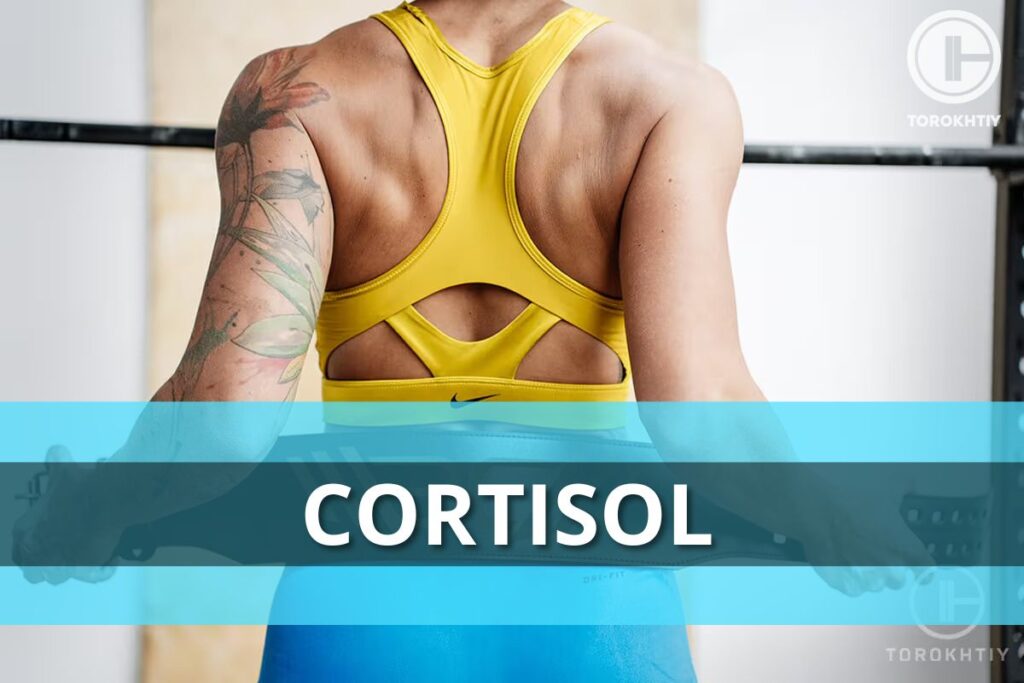Cortisol
Author:
Unlock your full potential by engaging with our experts and community! Have questions about your fitness journey or looking for expert advice on weightlifting techniques? Don’t hesitate — leave a comment below and Sergii Putsov will provide a personalized answer and insights to help you reach your goals.
Torokhtiy is reader-supported. Some links are affiliate links, and we may earn a commission at no extra cost to you. See our disclosure page for details.

In the modern world, lifestyle has become similar to the “hamster wheel” when each person tries to find time to eat, train, work and have a rest. Unfortunately, non-compliance with the regime of training, sleep and nutrition leads to a violation of the hormonal regulation and the adrenal glands suffer first. Let’s find out the consequences and understand how to cope with them.
Cortisol is a hormone which is produced in the adrenal glands and regulates a wide range of processes throughout the body, including metabolism and the immune response. It stimulates the release of glucose from glycogen, thereby increasing its level in the blood, it has a catabolic (muscle breakdown) effect on muscles, bone and adipose tissue. In addition, cortisol regulates water-electrolyte balance. We really need this hormone and it should be maintained within the normal levels since it is the stress hormone which protects our body from the most unforeseen situations.
Our way of life has become similar to a hectic schedule where many people try to get everything done within 24 hours each day, depriving themselves of sleep, adequate nutrition, optimal workouts and recovery. This leads to increased work of the adrenal glands and an increase in cortisol level, and in future, if nothing changes, adrenal fatigue syndrome may occur. In these circumstances cortisol is barely produced that has a very negative impact on the human body.
It is very important to monitor the cortisol levels with athletes, as the results and progress depend primarily on it. Cortisol can have a negative impact on sleep, mood, sex drive, bone health, ligament health, cardiovascular health and athletic performance, potentially causing fatigue and inflammation. Symptoms such as swelling, chronic fatigue, unwillingness to exercise, reduced libido, loss of muscle tissue and storing of fat around the waist indicate that the adrenal glands probably no longer work and measures should be taken.
You may like it:

What measures are we talking about? Everything is very simple, but as practice shows, not many succeed, everyone wants a “magic pill”.
In order to normalize cortisol levels and get back on track, you must:
- go to bed until 10 p.m. daily and air the room before going to bed;
- drink less coffee, especially after 2 p.m. and on an empty stomach, caffeine is an additional stimulant of cortisol;
- if you smoke – this is a bad idea and the game with nicotine will have to end;
- the same applies to alcohol, it is desirable to exclude it completely;
- periodization of the training sessions is very important: shock training should alternate with medium and light training.
- rest days should be devoted to quality recovery;
- carefully study the supplements that you take (if any), perhaps they caused the hormonal disbalance.
- food should be balanced with a sufficient amount of protein and fat. Exclude simple carbohydrates and refined products, especially for breakfast.
An inadequate and unbalanced diet and a chronic elevated cortisol level can lead to water retention and result in weight gain, therefore it is necessary to include sulfur-containing foods: broccoli, cauliflower, onions, garlic, Brussels sprouts, zucchini, eggs and foods rich in magnesium — nuts, pumpkin seeds, sesame, beans.
Keeping hydrated is crucial for health and the regulation of stress hormone, although excessive quantities have been known to have adverse effects.
To restore full body function, such things as swimming, stretching, myofascial release, sauna, massage should be written in the calendar and performed weekly.
If you do everything in complex – after a couple of weeks cortisol will begin to return to normal levels and your health will definitely improve. The main thing is to do everything without fanaticism.
Train together – train right!
You might be interested in:
Why Trust Us?
With over 20 years in Olympic weightlifting, strength training, nutrition coaching, and general fitness our team does its best to provide the audience with ultimate support and meet the needs and requirements of advanced athletes and professional lifters, as well as people who strive to open new opportunities and develop their physical capabilities with us.
By trusting the recommendations of our certified experts in coaching, nutrition, and sports training programming, as well as scientific consultants, and physiotherapists, we provide you with thorough, well-considered, and scientifically proven content. All the information given in the articles concerning workout programming, separate exercises, and athletic performance, in general, is based on verified data.
The product testing process is described in more detail here.
Author: Sergii Putsov
Head of Sport Science, PhD
Best Results: Snatch – 165 kg,
C&J – 200 kg
Sergii Putsov, Ph.D., is a former professional weightlifter and National team member, achieving multiple medals in the 94 kg weight category at national competitions. With a Master’s degree in “Olympic & Professional Sport Training” and a Sport Science Ph.D. from the International Olympic Academy, Greece, Sergii now leads as the Head of Sport Science. He specializes in designing training programs, writing insightful blog articles, providing live commentary at international weightlifting events, and conducting educational seminars worldwide alongside Olympic weightlifting expert Oleksiy Torokhtiy.




Still have questions after reading our article? Unlock your full potential by engaging with our experts and community! Don’t hesitate — leave a comment below and Sergii Putsov will provide a personalized answer and insights to help you reach your goals.